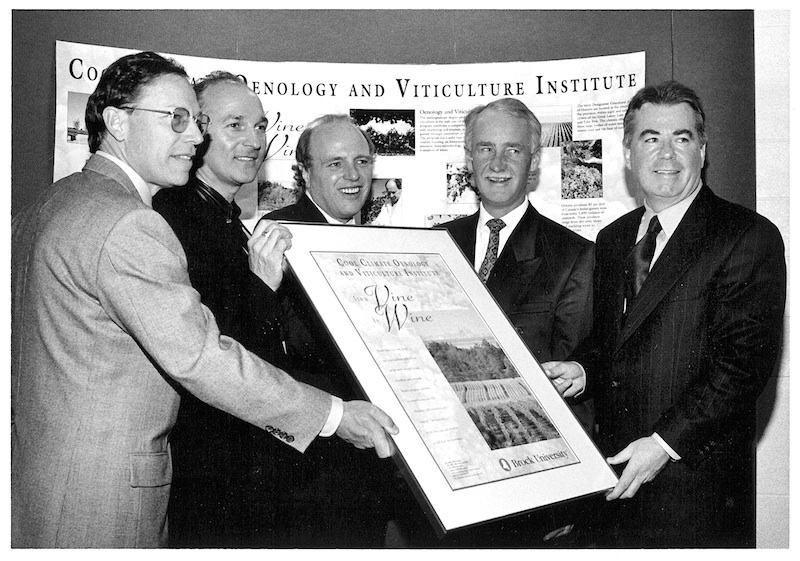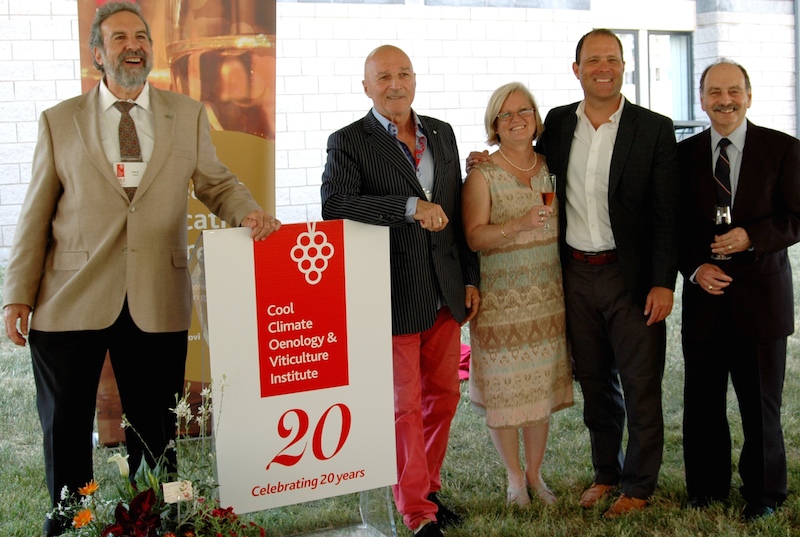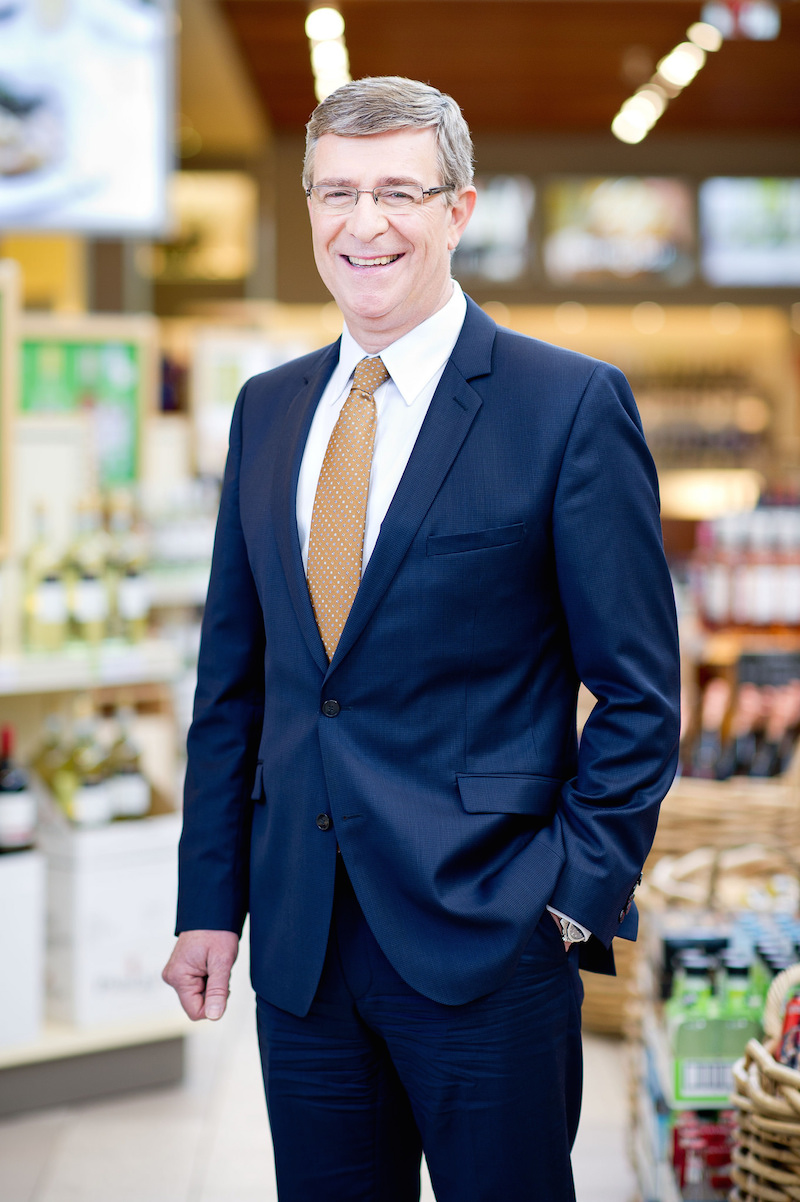
A round up of news that has an impact on the Ontario wine industry from news releases sent to Wines In Niagara.
A grape and wine research success story
made in Canada
Under a marquee tent at Brock University, about 100 researchers, grape and wine industry leaders and friends gathered June 24 to sip wine and celebrate a milestone birthday.
Two decades ago, Brock created its Cool Climate Oenology and Viticulture Institute, supported by the Wine Council of Ontario and the Grape Growers of Ontario.
On Friday, some of the original architects of Canada’s renowned grape and wine research unit were back for the party, mingling with the current generation of vintners and celebrating the institute they all know as CCOVI.
The mood was relaxed as revelers toasted the success of CCOVI — with Canadian wine, of course — and remarked over how impactful the institute has become since being devised by a group of professors, grape growers and winemakers in a hotel meeting room 20 years ago.

Brock President Jack Lightstone told Friday’s gathering that those original schemers essentially mapped out a key part of the University’s future.
“Those pioneers were determined to make it happen,” said Lightstone. “Because of your work, we hit on the model of how Brock should organize research at our university.”
Donald Ziraldo, the Canadian wine icon who was among those early innovators, paid tribute to then-Brock President Terry White and senior academic Bill Cade.
“They initiated it.” Ziraldo recalled. “They were the ones who approached us. And look what happened as a result. The industry needs to continue supporting this, because without the research, we won’t get very far trying to move forward.”
CCOVI Director Debbie Inglis, herself a grape farmer as well as a CCOVI scientist, said the institute proves the value of collaboration between industry and academia.
“The best is yet to come,” said Inglis.
What began in 1996 as a single science lab (CCOVI didn’t have its own building until 1999) is today an internationally-recognized centre of experts whose work priority is determined by the grape and wine industry’s most pressing needs.
Last year, an independent study determined that CCOVI contributed more than $91-million and the equivalent of 307 jobs to Ontario’s economy in 2014-15.
Public outreach and industry engagement have remained central to its DNA. For example:
- CCOVI analytical services are used by winemakers, grape growers and consultants across Canada;
- Its VineAlert program helps hundreds of grape growers avoid vine loss from extreme weather events;
- Its annual lecture series examining key industry issues has informed hundreds of grape growers and winemakers in-person and online around the world;
- CCOVI advances the skills of more than 120 people each year through its internationally-recognized WSET training program. But no such support structure existed before the mid-1990s, when a group of 37 people who became known as the Queen’s Landing Forum began meeting to discuss how to address the needs of Canada’s rapidly expanding grape and wine industry. The dialogue saw leaders from Brock University, located in the heart of Niagara grape and wine country, brainstorming alongside industry figures like Ziraldo, Paul Bosc, Howard Staff, John Howard, Karl Kaiser and others.
Canadian wine writer Linda Bramble was in the room in ’96. She recalls Bill Cade, then Brock’s Dean of Mathematics and Science, as “the real driving force” who brought in the wine industry leaders and grape growers.
“Cade was very careful to get community buy-in,” says Bramble. “His energy and enthusiasm was contagious. I remember being split into groups to discuss specific questions and reporting back. The air was filled with possibility.
“I remember Donald (Ziraldo) repeating, ‘Every significant wine region in the world has a research institute associated with it. We need this, too!’ The vision was local as well as global, since it was seen as focusing on cool climate research rather than depending on the research that came out of California or Bordeaux, or even northern Italy.
“This was to be our niche: Advance the local industry, yet have a global reach.”
By October 1996, Brock officially created the institute that would focus on the needs of the grape and wine industry and the continuing education of the community.
Its role has steadily grown. In 1999 CCOVI moved into the new Inniskillin Hall, which was built largely because Ziraldo and John Howard led a $2.1-million fundraising campaign from members of the grape and wine industry across Canada.
Through the intervening years, governments and industry have contributed millions of dollars in research funding, and CCOVI has helped form a national network of industry support groups from BC’s Okanagan Valley to Nova Scotia.
Last month CCOVI helped fuse a national effort that travelled to the UK and resulted in Canada being chosen to host the 2020 International Cool Climate Wine Symposium, one of the world’s most prestigious wine conferences, for which Brock will be the host site.
During the 20th birthday party, Director Inglis said the CCOVI story illustrates what can happen when a university collaborates with industry and government.
“People work together, problems get solved and great things are achieved,” said Inglis. We look look forward to continuing with these partnerships and further expanding the impact all across Canada.”
2016 grape price agreement reached with
Grape Growers of Ontario, Wine Council of Ontario,
Winery & Grower Alliance of Ontario

The Grape Growers of Ontario, Wine Council of Ontario and Winery & Grower Alliance of Ontario concluded the 2016 grape pricing agreement ahead of schedule. The agreement provides an overall price increase of 2% for one year. In addition, the agreement extends the plateau pricing program for one year.
“The constant in our industry is the consistent grape quality our growers produce every year to make 100% Ontario grown wine. This agreement recognizes that growers, with their wine partners, can work together to collectively build and strengthen our grape and wine industry’s future,” said Matthias Oppenlaender, Chair, Grape Growers of Ontario.
“WGAO members purchase some 85% of the grapes grown by independent farmers in Ontario for VQA and International Canadian Blend (ICB) wines, and we are very pleased that grape growers and processors have arrived at a very fair and equitable agreement for grape prices in 2016,” stated Del Rollo, Chair, Winery & Grower Alliance of Ontario.
“I’m pleased we were able to reach an agreement on grape pricing for the 2016 harvest. The agreement provides price certainty, which will help wineries plan and potentially grow their businesses,” said Allan Schmidt, Chair, Wine Council of Ontario.
Ontario’s grape and wine industry is a significant economic driver to the provincial economy which contributes over $3.3 billion economic impact through jobs, tourism and taxes, particularly in the province’s designated viticulture areas: Niagara Peninsula, Prince Edward County, Lake Erie North Shore, and the emerging South Coast region.
LCBO announces appointment of
Dr. George Soleas as new president and CEO

LCBO Chair Edward Waitzer announced the appointment of Dr. George Soleas M.Sc., PhD, to the position of President and Chief Executive Officer of the LCBO.
“Dr. Soleas has successfully led many aspects of LCBO’s operations and built strong working relationships with suppliers and other key stakeholders. At a time when LCBO faces significant opportunities and challenges, he brings in-depth knowledge of the sector and organization, and a proven record of innovation, teamwork and public service,” says Waitzer.
In 1997, after spending more than a decade working in the Ontario wine industry, George joined the LCBO as Director of Quality Assurance. Under his leadership the department was transformed into a state-of-the-art, profitable and internationally-endorsed laboratory facility. This success led to the expansion of his portfolio in 2008 to include Logistics, where he implemented a series of changes to improve the efficiency and safety of Specialty Services and LCBO retail distribution centres. This included championing the development of LCBO’s patent-pending automatic palletizer technology, which has won domestic and international awards.
In 2013, George was promoted to Executive Vice President, assuming responsibility for Information Technology, Store Development & Real Estate, and Resource Protection.
“LCBO is entering a more competitive marketplace and needs someone with both experience and passion to continue to fulfil its mandate as a profitable, customer-focused and socially responsible retailer. Given the depth of his involvement in the beverage alcohol industry, both inside and outside the LCBO, George is well positioned to guide the organization as it continues to evolve to meet the needs of the marketplace and serve its customers,” Waitzer added.
Cider now available in grocery stores

Ontario has further expanded consumers’ options for buying alcohol by permitting cider sales immediately at 60 grocery stores already selling beer across the province.
Premier Kathleen Wynne made the announcement at Sobeys Northfield in Waterloo. Allowing cider to be sold in grocery stores is part of the biggest shakeup to beverage alcohol retailing in Ontario since prohibition ended in 1927. The shakeup began with last December’s launch of beer in grocery stores.
The LCBO also launched a request for bids for 70 additional grocery stores to sell wine, beer and cider starting this fall.
Eventually, up to 300 grocery stores — both large chains and independents — could sell wine, beer and cider. An additional 150 stores could be authorized to sell just beer and cider. As well, up to 150 existing winery retail stores that operate just outside a grocery store’s checkout will be permitted to move inside the store and share the checkout. These winery retail stores will broaden their assortment to sell wines made by any Ontario producer.
Ontario is expanding access to alcohol responsibly. The same social responsibility requirements apply to cider sales in grocery stores as beer, including standard hours of sale and rigorous training for staff. Restrictions will also apply to ensure responsible retailing of wine in grocery stores. Ontario is currently developing a comprehensive alcohol policy to support the safe consumption of alcohol.
Cider is a fast-growing segment of the market. The LCBO’s sales of locally made craft cider grew by 54 per cent in 2015-16, to a total of $5.1 million. Ontario’s cider producers are thriving, creating jobs and fuelling growth in the agriculture and tourism sectors.
Offering consumers more choice and convenience while improving opportunities for businesses is part of the government’s economic plan to build Ontario up and deliver on its number-one priority to grow the economy and create jobs. The four-part plan includes investing in talent and skills, including helping more people get and create the jobs of the future by expanding access to high-quality college and university education. The plan is making the largest investment in public infrastructure in Ontario’s history and investing in a low-carbon economy driven by innovative, high-growth, export-oriented businesses. The plan is also helping working Ontarians achieve a more secure retirement.
Quick Facts
- Introducing cider and wine to grocery stores was part of the final recommendations from the Premier’s Advisory Council on Government Assets chaired by Ed Clark.
- The government conducted extensive industry consultations to define a fair and socially responsible model for beer, wine and cider sales in grocery stores.
- Ontario is working to have beer and cider available for sale in up to 150 grocery stores by May 1, 2017. Wine will be introduced alongside beer in up to 300 grocery stores, starting with 70 additional stores in the fall of 2016. Ultimately, up to 450 grocery stores provincewide could sell beer and cider.
- Interested grocery retailers can register for the open and transparent request for bids run by the LCBO at Biddingo under LCBO RFB # 2016-010. The deadline for submissions is August 5. A third-party Fairness Commissioner will oversee the bidding process.





Comment here